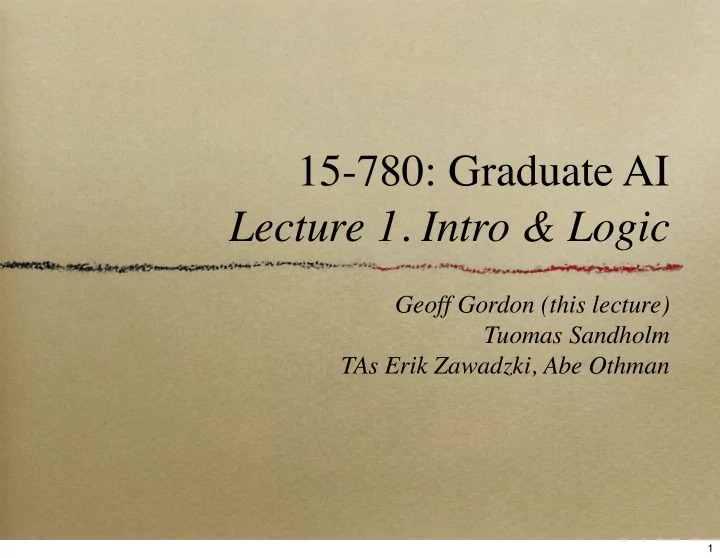

15-780: Graduate AI Lecture 1. Intro & Logic Geoff Gordon (this lecture) Tuomas Sandholm TAs Erik Zawadzki, Abe Othman 1
Admin 2
Website 15-780 ⊗ Graduate AI ⊗ Spring 2011 Tuesdays and Thursdays from 10:30-Noon in GHC 4307. School of Computer Science, Carnegie Mellon University. This class is taught by People Professors Geoff Gordon and Tuomas Sandholm. The TAs are Abe Othman and Erik Zawadzki. Office hours are at noon after class on Tuesday (Tuomas - GHC 9205) and Thursday (Geoff - GHC 8105). Abe and Erik have their office hours Monday at 8pm and http://www.cs.cmu.edu/~ggordon/780/ http://www.cs.cmu.edu/~sandholm/cs15-780S11/ 3
Website highlights Book: Russell and Norvig. Artificial Intelligence: A Modern Approach, 3rd ed. Grading: 4–5 HWs, “mid”term, project Project: proposal, 2 interim reports, final report, poster Office hours Recitation ( when? ) 4
Website highlights Authoritative source for readings, HWs Please check the website regularly for readings (for Lec. 1–3, Russell & Norvig Chapters 7–9) 5
Background Suggest familiarity with at least some of the following: Linear algebra Calculus Algorithms & data structures Complexity theory Logic 6
Waitlist, Audits Audits: register, fill out audit form Must do final project, but no HWs, tests Waitlist: if you’re on it, let us know If you need us to sign something, catch us after class or in office hours 7
Course email list 15780students AT cs.cmu.edu To subscribe/unsubscribe: email 15780students-request@… word “help” in subject or body By the end of this week, everyone’s official email should be in the list—we’ll send a test message 8
Intro 9
Definition by examples Card games Poker Bridge Board games Deep Blue TD-Gammon Samuels’s checkers player 10
Web search 11
Recommender systems 12
Computer algebra systems from http://www.math.wpi.edu/IQP/BVCalcHist/calctoc.html 13
Grand Challenge road race Red team: Whittaker et al Junior: Thrun et al 14
Robocup Veloso et al 15
Landing a “bird” Standard airplane: laminar flow over wings “easy” simulation and control problem Birds: way beyond performance envelope of planes http://www.youtube.com/watch?v=LA6XSrM0V_0&feature=player_embedded Secret: exploit turbulent flow (e.g., push off from vortex) But can’t efficiently solve diff eqs for simulation, much less use them to plan optimal landing 16
Landing a “bird” Cory, Tedrake, et al. 17
Landing a “bird” Cory, Tedrake, et al. 18
Kidney exchange In US, ≥ 50,000/yr get lethal kidney disease Cure = transplant, but donor must be compatible (blood type, tissue type, etc.) Wait list for cadaver kidneys: 2–5 years Live donors: have 2 kidneys, can survive w/ 1 Illegal to buy/sell, but altruists/friends/family donate 19
Kidney Exchange Patient Patient Donor Donor Pair 1 Pair 2 20
Kidney Exchange Patient Patient Donor Donor Pair 1 Pair 2 20
Optimization: cycle cover Cycle length constraint ⇒ NP-complete combinatorial optimization National market: ~10,000 patients at any one time 21
More examples Motor skills: riding a bicycle, learning to walk, playing pool, … Vision Social skills: attending a party, giving directions, … 22
More examples Natural language understanding Speech recognition 23
Common threads Finding the needle in the haystack Search Optimization Summation / integration Set the problem up well (so that we can apply a standard algorithm) 24
Common threads Sequential decisions, delayed feedback Shoot or pass Steering a car Landing a “bird” 25
Common threads Managing uncertainty chance outcomes (e.g., dice) sensor uncertainty (“hidden state”) other agents 26
Classic AI No uncertainty, pure search Mathematica deterministic planning Sudoku This is the topic of Part I of the course http://www.cs.qub.ac.uk/~I.Spence/SuDoku/SuDoku.html 27
Uncertainty Adding outcome or sensor uncertainty to planning: unsolved problem, lots of current AI research one-step decisions: graphical models outcome only: MDPs sensors: POMDPs, DBNs other agents: game theory Topic of Part II of course 28
Recommend
More recommend